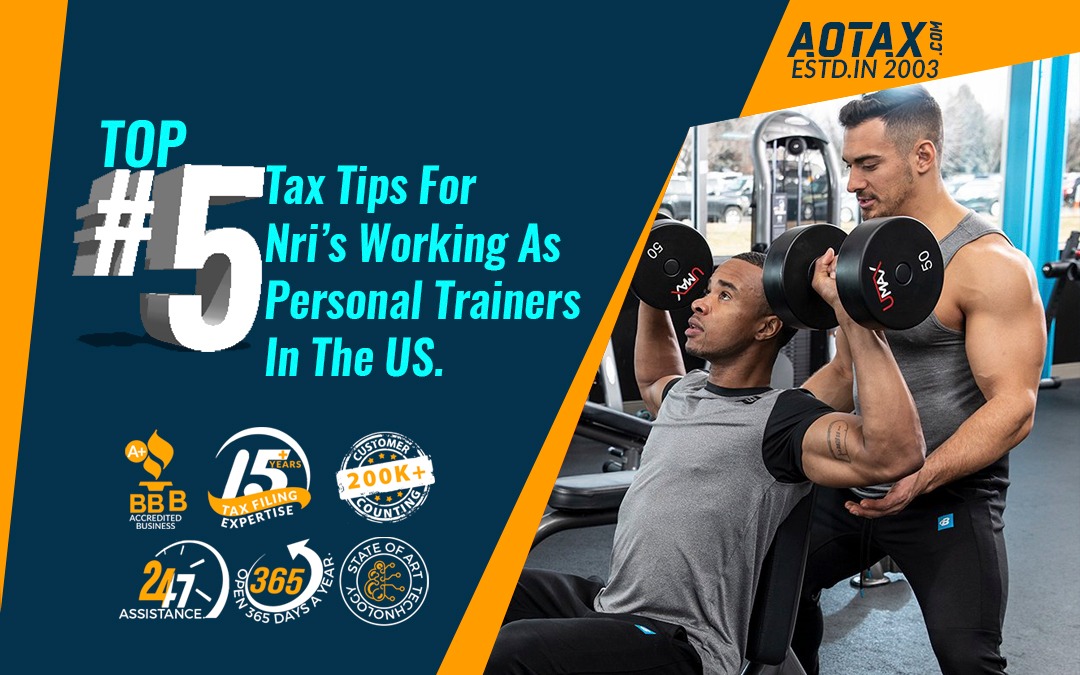
Top #5 Tax Tips For NRI’s Working As Personal Trainers In The US
Top #5 Tax Tips For NRI’s Working As Personal Trainers In The US
Being self-employed brings a lot to the table. From having the freedom to choose your work timings to create a business on your own. Though there are a few challenges, the positives far outweigh the negatives. And it gets even better if you happen to be a personal trainer as you get a chance to help people stay fit. However, being self-employed also means that you have to handle your taxes on your own. Here are top 5 tax tips for NRIs working as Personal Trainers.
- Setting Up Costs
If you just started as a personal trainer in the country, the chances are high you would have spent a considerable amount of money on creating a website, advertisements, marketing, figuring out business location, etc. You can deduct these expenses from your taxes.
- Cost of Procuring Equipment
The IRS allows deductions for work related equipment. For any fitness equipment that you have purchased or any training related tools, you can get a healthy tax break on the same. For instance, if you buy any equipment that your clients will be using, you can claim the expenses for a tax break. And the location of the equipment used doesn’t matter much. Meaning, clients can use the equipment or tools in your place, their place, your studio, etc. The only verifying parameter is that the equipment must be used for business.
- Educational and Training Materials
Educational and training materials offer dual benefits. For starters, you can claim for any educational or training expenses for your clients as well as for yourself. One of the prime examples is that if you undergo any training or educational courses to enhance your skillset, you can claim the amount as deductions. Similarly, if you have any apps or training videos that your clients use, you can claim those as deductions as well.
- Travel Expenses
There is a very good possibility that you must travel to meet with your clients. As a self-employed individual, you can claim these expenses as well. You can claim a deduction of 58 cents per mile that you drive. If you drive to your client’s place for a training session, you can claim this amount. Though it might not seem a lot at first, if you keep driving to the client’s place regularly, it can add up to be a considerable expense. The IRS even allows deductions under the pretext of depreciation of the vehicle, if you use your vehicle to drive to client’s place.
If you must fly to any client’s place, you can claim the flight expenses along with any hotel accommodation. The IRS even allows you to deduct up to 50% of the meals that you consume on such trips.
- Business Expenses
There are some generic business-related expenses that are common to everyone. If you have a dedicated phone line to interact with clients or take calls from potential clients, you can claim the bills. If you have to acquire a state license for your personal training classes, you can claim them as deductions as well. Similarly, you can utilize any expenses related to the bookkeeping of your business or tax preparation for a tax break.
If you are using your primary bank account for business, any changes that you pay to the bank for the account is also tax-deductible.
- Health Insurance
Any contributions that you make towards health insurance plans or retirement plans for your future are also tax deductible. One of the benefits of being self-employed is that you can even deduct your premiums paid for health insurance.
Knowing everything about taxes and especially the ones pertaining to your occupation is important to be able to plan taxes and reduce liability.

Recent Comments